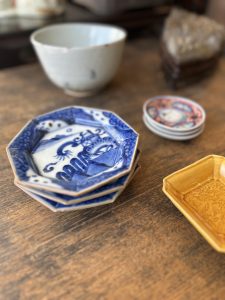江戸言葉、今の若者も使っていました(愛知県名古屋市千種区姫池通 骨董買取 古美術風光舎)
2025.02.15
先日、大河ドラマ「べらぼう」を観ていると、台無しになるという意味で「全てパァになった」というセリフが聞こえてきました。一緒に観ていた家族が、「江戸時代にパァになるなんて言ってたのかな?」と一言。確かにと思い調べて見ましたが、結局のところよく分かりませんでした。
ただ調べているうちに意外な言葉が江戸時代から使われていたことが分かりました。
現代の若者言葉だと思っていた「マジ」や「ヤバい」が江戸の町で使われていたとのこと。
「ヤバい」は今では「飛び抜けて良い」の意味でも使われるため頻繁に耳にします。かなりの範囲を「ヤバい」だけで済ますことができ、うちの子供達を含め語彙力が乏しくならないか心配にもなります。
「やば」とは元々、法に触れて不都合なことや危険な状態を表す言葉で、江戸時代に書かれた滑稽本である「東海道中膝栗毛」にも「やばなこと」という表現が見られるそうです。なぜ危ないことを「やば」というのかは諸説あるようですが、江戸時代の射的場「矢場」に由来しているという説もあり、矢場の裏で違法なお店を営んでおり、役人から目をつけられていたため「ヤバい」という言葉が生まれともいわれているそうです。
「まじ」は今でも「本気」「真剣」という意味で使われますが、江戸時代では芸人たちの楽屋言葉として使われていたそうで、「真面目」の略語であったようです。歌舞伎にも「マジな心」などのセリフがあるらしく、想像するとちょっと笑ってしまいます。
ドラマのタイトルにもなっている「べらぼう」は「常識はずれ」を意味する江戸の方言で、現代では「べらぼうに高い」などのように使われます。よく江戸言葉を「べらんめえ」調といいますが、「べらぼうめ」がくずれた言い方だそうです。
江戸言葉は町人社会で発達した言葉で、、参勤交代や地方からの人々が流入してきたことにより日本各地の方言が影響をあたえたとされ、徳川家康の出身地である三河地方の方言をはじめ、様々な方言がも混合して江戸言葉が成立した考えられています。
「ai発音のe化」とよく言われ、「違いない」は「ちげーねー」、「入る」は「へーる」などとなることが多く、せっかちな江戸の町人が早くしゃべるうちにこのようになっていったようです。
「何を言ってやがるんだい」が「てやんでい」になるのですから相当急いでいたのでしょうね。
江戸言葉というと、ちょっと荒っぽい言葉が多い気がしており、やはり早口の江戸口調は迫力が出るので生き残ってきたのかと思いきや、幼児に使う言葉にも多く名残があるそうです。
寝ることを「ねんね」、おなかを「ぽんぽん」、汚いことを「ばっちい」などの幼児語のルーツは江戸言葉に多数といわれています。どの言葉も優しい響きがありますね。
他にも、野暮、がさつ、でたらめ、のろま、びびるなど、由来なども面白いものが多くありますので、興味のある方は調べてみてはいかがでしょうか。

それでは、また次の機会に。(スタッフH)
The other day, I was watching the historical drama “Bera-bo” and heard the line “everything went paa”, meaning to be ruined. A family member who was watching it with me asked, “Did they ever say anything about it going poof in the Edo period?” I looked it up. I looked it up, but in the end I didn’t really understand it.
However, as I looked into it, I found out that an unexpected word had been used since the Edo period.
I had thought that “Maji” and “Yabai,” which I had thought were modern youth words, were used in the Edo period.
We hear “yabai” frequently today because it is also used to mean “eclipsing good. I worry that my children and others might not have a good vocabulary because they can get by with just “yabai” to a great extent.
The word “yaba” was originally used to describe an inconvenient or dangerous situation in violation of the law, and the expression “yaba koto” can be found in “Tokaido chu hizakurige,” a comic book written in the Edo period (1603-1867). There are various theories as to why dangerous things are called “yaba,” but there is a theory that the word “yabai” was derived from “yaba,” a shooting range in the Edo period, where people ran illegal stores behind the yaba and were watched by officials, thus giving birth to the word “yabai.
Maji” is still used today to mean ‘serious’ or ‘earnest,’ but in the Edo period it was used as a backstage term by geisha, and was apparently an abbreviation for ”serious. It seems that Kabuki also has lines such as “serious mind,” which makes me laugh a little when I imagine it.
The word “beranme”, which is also used in the title of the drama, is an Edo dialect meaning “out of the ordinary”, and is used today as in “beranme ni takara”, which means “very high”. The Edo dialect is often referred to as “beranme-te” style, which is a corruption of the word “berobo-me.
The Edo dialect was developed in the town people’s society, and it is believed to have been influenced by dialects from various parts of Japan, such as the dialect of the Mikawa region where Tokugawa Ieyasu was born, as well as various other dialects, which mixed together to form the Edo dialect.
It is often referred to as the “e-ization of ai pronunciation,” with “違いない” often becoming “chige-ne” and “iru” “he-ru” “enter,” etc. It seems that the impatient Edo townspeople developed this way of speaking as they spoke quickly.
Since “what are you talking about?” becomes “teyandai,” they must have been in a great hurry.
I thought that the Edo dialect had a lot of rough words, and I wondered if it had survived because the fast-talking Edo tone is more powerful, but it seems that there are many remnants in the words used for infants.
It is said that many infant words such as “nenne” for sleeping, “pompon” for tummy, and “battei” for dirty have their roots in the Edo dialect. All of these words have a gentle sound.
There are many other interesting origins as well, such as “nogure,” “gassatsu,” “bullshit,” and “noroma,” so if you are interested, why don’t you look them up?
So, I’ll see you next time. (Staff H)
*****************
ご実家の整理やお片付けなどをされている方のご相談などが多くございます。
お片付けなどくれぐれもご無理のないようになさってくださいませ。
風光舎では古美術品や骨董品の他にも絵画や宝石、趣味のお品など様々なジャンルのものを買受しております。
お片付けをされていて、こういうものでもいいのかしらと迷われているものでも、どうぞお気軽にご相談下さいませ。
また風光舎は、出張買取も強化しております。ご近所はもちろん、愛知県内、岐阜県、三重県その他の県へも出張いたします。
まずは、お電話お待ちしております。
愛知県名古屋市千種区姫池通
骨董 買取【古美術 風光舎 名古屋店】
TEL052(734)8444
10:00-18:00 OPEN
#出張買取#骨董#古美術#骨董品#絵画#版画#茶道具#刀剣#彫刻

